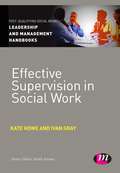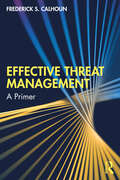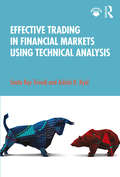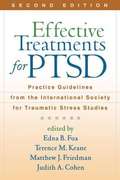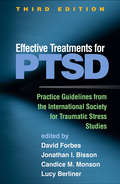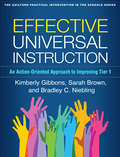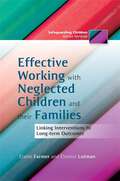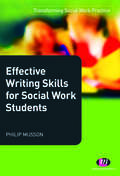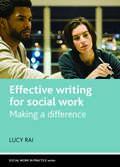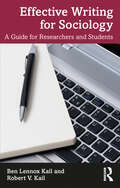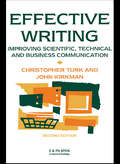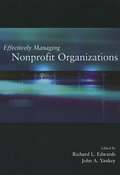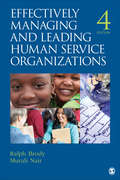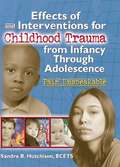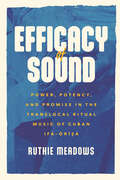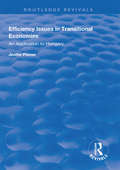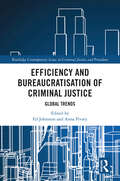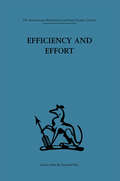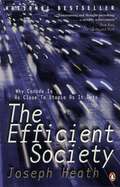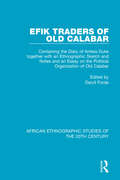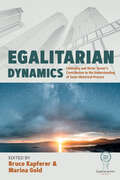- Table View
- List View
Effective Supervision in Social Work (Post-Qualifying Social Work Leadership and Management Handbooks)
by Ivan Lincoln Gray Kate HoweIt is vital that social work managers and leaders are able to deliver and manage effective supervision to their teams. Recent social work reports such as the Munro Review into Child Protection (2011) identified poor supervision as a barrier to good and effective social work practice and highlighted the need for quality supervision to become embedded within departments. This book demonstrates how both managers and their staff can engage with supervision with a view to successful outcomes. There are detailed sections on audit tasks and reflection questions to enable readers to increase awareness of their role as well as develop action plans for improvement in their practice.
Effective Threat Management: A Primer
by Frederick S. CalhounEffective Threat Management: A Primer presents the ABCs for identifying, assessing, and managing potentially violent individuals. By offering practical advice and tactics for dealing with problem individuals, the Primer serves as an ideal reference source for threat management professionals and as a practical introduction to threat management best practices for those new to the field. The question-and-answer format makes finding information easy. The book offers tips and cautions on practical ways to implement an effective threat management program in various situations, such as interpersonal relationships, schools, workplaces, public gathering places, or religious establishments. The Primer emphasizes practical, field-tested approaches to the challenges of identifying, assessing, and managing problem individuals.In the Primer, author Frederick S. Calhoun, a respected expert in threat assessment and management, shows how to set up a threat management process free of elaborate procedures or significant commitments of resources. The Primer offers a practical, step-by-step process for identifying, assessing, and managing problem individuals. Each section answers specific questions. A quick reference guide allows users to quickly locate specific issues or topics. Text boxes throughout the Primer offer practical support, helpful cautions, and real case-study illustrations.This user-friendly book will help threat management professionals in law enforcement and security positions as well as other professionals potentially facing threats, such as mental health practitioners, teachers, HR professionals, small business owners, and anyone else confronted with the need for threat management.
Effective Trading in Financial Markets Using Technical Analysis
by Smita Roy Trivedi Ashish H. KyalThis book provides a comprehensive guide to effective trading in the financial markets through the application of technical analysis through the following: Presenting in-depth coverage of technical analysis tools (including trade set-ups) as well as backtesting and algorithmic trading Discussing advanced concepts such as Elliott Waves, time cycles and momentum, volume, and volatility indicators from the perspective of the global markets and especially India Blending practical insights and research updates for professional trading, investments, and financial market analyses Including detailed examples, case studies, comparisons, figures, and illustrations from different asset classes and markets in simple language The book will be essential for scholars and researchers of finance, economics and management studies, as well as professional traders and dealers in financial institutions (including banks) and corporates, fund managers, investors, and anyone interested in financial markets.
Effective Treatments for PTSD, Second Edition
by Edna Foa Terence KeaneDeveloped under the auspices of the PTSD Treatment Guidelines Task Force of the International Society for Traumatic Stress Studies, this tightly edited work is the definitive best-practice reference for practitioners caring for any trauma population. Leading clinical scientists thoroughly review the literature on widely used therapeutic approaches for both adults and children. Succinct treatment guidelines are presented that feature standardized ratings of the evidence for each approach. The book also offers insightful guidance to help clinicians select the most suitable therapy for particular patients and overcome frequently encountered obstacles. New to This Edition Expanded with six additional chapters on child and adolescent treatments. Adult chapters thoroughly revised to reflect the rapidly growing evidence base. Chapter on treating other psychiatric problems that co-occur with PTSD.More coverage of early intervention and prevention.
Effective Treatments for PTSD, Third Edition: Practice Guidelines from the International Society for Traumatic Stress Studies
by David Forbes, Jonathan I. Bisson, Candice M. Monson, Lucy BerlinerGrounded in the updated Posttraumatic Stress Disorder Prevention and Treatment Guidelines of the International Society for Traumatic Stress Studies (ISTSS), the third edition of this definitive work has more than 90% new content. Chapters describe PTSD assessment and intervention practices that have been shown to work and provide practical, real-world implementation guidance. Foremost authorities address the complexities of trauma treatment with adults, adolescents, and children in diverse clinical contexts. The book delves into common obstacles and ways to overcome them, when to stop trying a particular approach with a client, and what to do next. Special topics include transdiagnostic interventions for PTSD and co-occurring problems, dissemination challenges, and analyzing the cost-effectiveness of treatments. Prior edition editors: Edna B. Foa, Terence M. Keane, Matthew J. Friedman, and Judith A. Cohen. New to This Edition *Fully rewritten to reflect over a decade of clinical, empirical, and theoretical developments, as well as changes in DSM-5 and ICD-11. *Increased research-to-practice focus--helps the clinician apply the recommendations in specific clinical situations. *New chapters on previously covered treatments: early interventions, psychopharmacotherapy for adults and children, and EMDR therapy. *Chapters on additional treatments: prolonged exposure, cognitive processing therapy, cognitive therapy, combined psychotherapy and medication, e-mental health, and complementary and alternative approaches. *Chapters on cutting-edge topics, including personalized interventions and advances in implementation science.
Effective Universal Instruction: An Action-Oriented Approach to Improving Tier 1 (The Guilford Practical Intervention in the Schools Series)
by Sarah Brown Kimberly Gibbons Bradley C. NieblingThis accessible volume helps school leadership teams accomplish the crucial yet often overlooked task of improving universal instruction--Tier 1 within a multi-tiered system of support (MTSS). Strong universal instruction reduces the numbers of PreK–12 students who may need additional services and supports. Providing clear action steps and encouraging guidance, the expert authors present a roadmap for evaluating the effectiveness of Tier 1, identifying barriers to successful implementation, and making and sustaining instructional improvements. In a large-size format with lay-flat binding for easy photocopying, the book includes 27 reproducible checklists, worksheets, and forms. Purchasers get access to a Web page where they can download and print the reproducible materials. This book is in The Guilford Practical Intervention in the Schools Series, edited by T. Chris Riley-Tillman.
Effective Urban Densification: A Guide for Professionals and the Housing Industry
by Barry JohnsThe housing crisis confronts two of North America’s contemporary urban challenges: affordability and the need to curtail urban sprawl through densification of existing communities. Advancing a novel formula labelled BAAKFIL, this book introduces a new way of thinking about affordability and revitalization of mature neighbourhoods and communities. Beginning with an exploration of the monoculture of homogenous, average quality suburban housing stock in North America, subsequent chapters explore the serious issue of land cost; infill, zoning and Nimbyism in the context of the mass housing industry. Then, bridging the gap between theory and practice, the author introduces a theoretical design approach (BAAKFIL) as a practical formula for adding affordable residential units in established single family neighbourhoods while respecting their defining features. The final chapters evaluate the efficacy of BAAKFIL as a conceptual model by exploring various ‘test bed’ sites where the framework is applied. This book will be a valuable resource for practicing architects in the housing domain, as well as for planners working in municipalities. It will also appeal to advanced undergraduate and postgraduate students of urban design and architecture.
Effective Working with Neglected Children and their Families: Linking Interventions to Long-term Outcomes
by Elaine Farmer Eleanor LutmanParents who neglect children present considerable challenges to child welfare professionals, and are often resistant to change. This book addresses an urgent need to ensure that social care interventions provide better long term outcomes for neglected children across services. Based on a substantial research study into social care provision for children, it provides a rare insight into the experiences of neglected children over a period of five years, examining the responsiveness of parents and children to social care support and their progress. Close-focus study of the decisions made on either side of services - by the children, the parents, the caregivers and related social and healthcare professionals - shows what works and what doesn't, in the long term. This important book highlights gaps in provision for neglected children after the initial referral stage, the risks and potential for professional interventions and how well the child protection system and the courts protect children. It suggests ways that local authorities and other professionals can meet the complex needs of the children most likely to fall through the safety net, the factors related to good outcomes for them and how to improve safeguarding strategies within and beyond children's services. Providing a critical account of policy, systems and practice, this book is essential reading for anyone who needs the latest evidence about safeguarding children, including policymakers, social workers and professionals in health care and the family justice system.
Effective Writing Skills for Social Work Students (Transforming Social Work Practice Series)
by Phil MussonThis concise text is written specifically to help students and practitioners hone their techniques and develop their skills when it comes to writing in a clear, accessible and, above all, rigorous manner. There are sections on good essay writing and how to construct an argument, referencing and plagiarism, and reflective and critical writing. More than just another study skills book, Effective Writing Skills for Social Work is focused on real, day-to-day practice issues and the complex academic demands faced by social work students.
Effective Writing for Social Work: Making a Difference (Social Work in Practice series)
by Lucy RaiBased on original research, this book offers students an insight into the nature and challenges of writing in social work practice, enabling them to improve their writing skills. It explores the ways in which both students and qualified social workers can be more effective in their writing through an awareness of the purpose, context and audience. It makes explicit the connections and differences between learning to write in university and communicating through writing in practice and explores the impact that new technologies have on academic and professional writing. Drawing on both research and examples from practice, Effective writing for social work is a valuable tool for students, educators, practitioners and managers to critically examine ways in which writing could better support best practice in social work.
Effective Writing for Sociology: A Guide for Researchers and Students
by Robert V. Kail Ben Lennox KailWriting well is an essential skill for sociologists, but few books help students learn to write well. Designed to help students produce a manuscript that is clear, concise, and compelling, Effective Writing for Sociology demonstrates and deconstructs what makes effective writing and how best to communicate scholarly ideas. The first half of the book addresses the fundamentals of good writing: writing clearly, conveying emphasis, writing concisely, and crafting effective paragraphs. The second half then looks to the three most important sections of a research report: framing an introduction, reporting results, and discussing findings. Each chapter of the book describes strategies for effective writing, illustrated with multiple examples and providing exercises where students can try their hand at implementing these strategies. The Epilogue provides tips on choosing a title as well as writing an abstract and method section; it also includes suggestions on how to master the tips described in the lessons. Ben Lennox Kail and Robert V. Kail’s book is essential reading in courses on research methods, qualitative methods, quantitative methods, sociological writing, and social science writing in allied disciplines such as education, criminology, health, and all research fields.
Effective Writing: Improving Scientific, Technical and Business Communication
by John Kirkman Christopher TurkEffective communication is vital to science, engineering and business management. This thoroughly updated second edition with a new chapter on the use of computers and word-processors gives clear, practical advice illustrated with real-life examples on how to select, organize and present information in reports, papers and other documents.
Effectively Managing Nonprofit Organizations
by Richard L. Edwards John A. YankeyEdwards (social work, Rutgers) and Yanky (family and child welfare, Case Western Reserve U. ) present a revision and expansion of two earlier books, Skills for Effective Human Services Management (1991) and Skills for Effective Management of Nonprofit Organizations (1998). Featuring contributions from 31 American academics, consultants, and nonprofit professionals, the text offers nonprofit managers a guide to the skills and competencies needed to lead today's nonprofit organizations successfully. The text is organized around the "competing values framework," a meta-theoretical model of organizational and managerial effectiveness. Coverage includes an overview of the framework followed by sections on its four skill areas--boundary-spanning, human relations, coordinating, and directing--and discussion of the skills needed to manage in turbulent times. For mid- and upper-level managers, and students of nonprofit or public management. Annotation ©2007 Book News, Inc., Portland, OR (booknews.com)
Effectively Managing and Leading Human Service Organizations (SAGE Sourcebooks for the Human Services)
by Ralph Brody Murali D NairNow in its Fourth Edition, Effectively Managing and Leading Human Service Organizations continues to provide invaluable creative ideas for achieving managerial success. Authors Ralph Brody and Murali Nair dissect and diagnose common workplace dilemmas, offering current and future managers the skills to implement positive changes in organizations large and small. Easy-to-read, this book connects a conceptual framework and essential managerial practices with hundreds of real-life examples and case studies of applied managerial skills in organizational settings.
Effects of Financial Globalization on Developing Countries: Some Empirical Evidence
by Shang-Jin Wei Kenneth Rogoff Eswar S. Prasad M. Ayhan KoseThis paper reviews recent empirical evidence, including some new research, on the effects of financial globalisation for developing countries. It focuses on three issues: whether financial globalisation promotes economic growth in developing countries; the impact on macroeconomic volatility in these countries; and factors that can help to harness the benefits of financial globalisation.
Effects of and Interventions for Childhood Trauma from Infancy Through Adolescence: Pain Unspeakable
by Sandra HutchisonSuccessfully reach out and help children through the worst times of their young lives! Effects of and Interventions for Childhood Trauma from Infancy Through Adolescence: Pain Unspeakable explores an array of trauma-related topics pertaining to children of all ages from a variety of cultures and countries. This book covers the various ego stages of child development and addresses how each one is affected by traumatic experiences. This easy-to-read resource serves as a readily available reference for caregivers-professional or otherwise-who work with or encounter a child who has been traumatized. In Effects of and Interventions for Childhood Trauma from Infancy Through Adolescence, you&’ll find actual accounts of traumatic incidents throughout the world, focused specifically on those incidents that have the most devastating impact on large groups of children. This book reviews the research on post-traumatic stress disorder and stress-response related symptoms with brief descriptions of treatments for you to use with children who suffer from posttraumatic stress. Special features of this important tool consist of with an extensive list of organizations and crisis hotline numbers as well as recommended reading, video, and curricula resources. Effects of and Interventions for Childhood Trauma from Infancy Through Adolescence examines traumatic situations from many angles, including: the many faces of trauma-accidents, fire, natural disasters developmental considerations, including ego development, memory development, and the development of fears and responses the way children respond to traumatic incidents the types of interventions-individual, group, family, pharmacological, and school-based cultural considerations from around the globe how to establish a school-based Trauma Response Team Effects of and Interventions for Childhood Trauma from Infancy Through Adolescence includes real case studies, fictional sample cases, and suggestions that walk you step-by-step through the possible scenarios that can occur with children during or after a traumatic event. Each section of the book ends with a helpful summary highlighting the most important information.
Efficacy of Sound: Power, Potency, and Promise in the Translocal Ritual Music of Cuban Ifá-Òrìsà (Chicago Studies in Ethnomusicology)
by Ruthie MeadowsThe first book-length ethnographic study on music and Ifá divination in Cuba and Nigeria. Hailing from Cuba, Nigeria, and various sites across Latin America and the Caribbean, Ifá missionary-practitioners are transforming the landscape of Ifá divination and deity (òrìṣà/oricha) worship through transatlantic travel and reconnection. In Cuba, where Ifá and Santería emerged as an interrelated, Yorùbá-inspired ritual complex, worshippers are driven to “African traditionalism” by its promise of efficacy: they find Yorùbá approaches more powerful, potent, and efficacious. In the first book-length study on music and Ifá, Ruthie Meadows draws on extensive, multisited fieldwork in Cuba and Yorùbáland, Nigeria, to examine the controversial “Nigerian-style” ritual movement in Cuban Ifá divination. Meadows uses feminist and queer of color theory along with critical studies of Africanity to excavate the relation between utility and affect within translocal ritual music circulations. Meadows traces how translocal Ifá priestesses (ìyánífá), female batá drummers (bataleras), and priests (babaláwo) harness Yorùbá-centric approaches to ritual music and sound to heighten efficacy, achieve desired ritual outcomes, and reshape the conditions of their lives. Within a contentious religious landscape marked by the idiosyncrasies of revolutionary state policy, Nigerian-style Ifá-Òrìṣà is leveraged to transform femininity and masculinity, state religious policy, and transatlantic ritual authority on the island.
Efficiency Issues in Transitional Economies: Application to Hungary (Routledge Revivals)
by Jenifer PiessePublished in 1999, this text uses a number of approaches to measure the performance of firms in the transition economies of Central Eastern Europe during the early stages of reform. There is considerable controversy about the level of productivity in this period, as is evident by contradictory evidence quoted in the literature and a high degree of inconsistency in published national statistics. Indeed, the disagreement extends to the measurement approach and the results for this group of countries. Particularly difficult is any analysis at the firm level, as data is inconsistent, incomplete and based on now out-dated accounting systems. The information used in this book is a panel data set of 64 items collected from 1000 firms across 25 industry sectors in Hungary. Productive efficiency is measured and the reasons for poor performance are discussed. It was found that industrial sectors differ in their average performance levels and in the factors most likely to account for this. Finally, recommendations are developed to help to reverse the decline in productivity.
Efficiency and Bureaucratisation of Criminal Justice: Global Trends (Routledge Contemporary Issues in Criminal Justice and Procedure)
by Ed Johnston and Anna PivatyThis book tackles the growing issues concerning the managerialism and bureacratisation of criminal justice systems across a number of jurisdictions. Here, managerialism means the move towards more standardised, bureaucratic and efficiency-driven systems, influenced by a desire to ensure predictability, control risks and, ultimately, economic savings via a more efficient process. The volume explores the phenomenon of managerialism in selected national criminal legal systems, covering all stages of criminal case processing from arrest to the imposition of sanction. The selected countries represent diverse socio-economic, political, cultural and legal traditions including common law, civil law, mixed common and civil law and post-Soviet tradition. The book engages with a variety of relevant theoretical concepts, such as fairness, rationality, efficiency and legitimacy. The authors critically examine whether and to what extent the trend towards managerialism is indeed discernible, and what are its likely effects in the given national criminal legal systems. The book will be of interest to students, researchers and practitioners working in the areas of comparative criminal justice and procedure.
Efficiency and Effort: An analysis of industrial administration
by W BaldamusTavistock Press was established as a co-operative venture between the Tavistock Institute and Routledge & Kegan Paul (RKP) in the 1950s to produce a series of major contributions across the social sciences. This volume is part of a 2001 reissue of a selection of those important works which have since gone out of print, or are difficult to locate. Published by Routledge, 112 volumes in total are being brought together under the name The International Behavioural and Social Sciences Library: Classics from the Tavistock Press. Reproduced here in facsimile, this volume was originally published in 1961 and is available individually. The collection is also available in a number of themed mini-sets of between 5 and 13 volumes, or as a complete collection.
Efficient Society
by Joseph HeathIn this fascinating account of what makes Canada such a successful society, Joseph Heath celebrates the much-maligned value of efficiency and asks some searching questions about the forces that threaten to undermine our quality of life. Canada is an efficient society, much more efficient than our neighbour to the south, where personal liberty takes precedence over collective well-being. This is one of the reasons, Heath argues, that the United Nations Annual Human Development Report consistently ranks Canada as the best place in the world to live. But this efficiency is under siege. Can we resist the allure of short-sighted tax cuts? Can we maintain our quality of life in the face of relentless pressure to increase our productivity - both at work and at home? This is a profound and important look at how government and business conspire to improve our lives - and at the dramatic changes that will decide our social and economic future.
Efficient Society Why Canada Is As Close To Utopia As It Gets
by Joe HeathIn this fascinating account of what makes Canada such a successful society, Joseph Heath celebrates the much-maligned value of efficiency and asks some searching questions about the forces that threaten to undermine our quality of life. Canada is an efficient society, much more efficient than our neighbour to the south, where personal liberty takes precedence over collective well-being. This is one of the reasons, Heath argues, that the United Nations Annual Human Development Report consistently ranks Canada as the best place in the world to live. But this efficiency is under siege. Can we resist the allure of short-sighted tax cuts? Can we maintain our quality of life in the face of relentless pressure to increase our productivity - both at work and at home? This is a profound and important look at how government and business conspire to improve our lives - and at the dramatic changes that will decide our social and economic future.
Efik Traders of Old Calabar: Containing the Diary of Antera Duke together with an Ethnographic Sketch and Notes and an Essay on the Political Organization of Old Calabar
by Daryll FordeOriginally published in 1956 this book contains extracts of the 18th century diary of an Efik chief and documents the activities of slave-traders, the rituals of the Egbo society and many details of domestic life of among the Efik. This volume includes an English translation to the diary which was originally written in Pidgin. .
Egalitarian Dynamics: Liminality, and Victor Turner’s Contribution to the Understanding of Socio-historical Process (Egalitarianism #2)
by Bruce Kapferer Marina GoldLiminality: the state of being ‘betwixt and between’ is one of anthropology’s most influential concepts. This volume reconsiders Victor Turner’s innovative extension of Arnold Van Gennep’s concept of liminality from within the Manchester tradition of Social Anthropology established by Max Gluckman. Turner’s work was grounded in ethnography and engaged with philosophical perspectives in varied socio-historical contexts, extending well-beyond the confines of the anthropology that initially inspired much of his work. Liminality has therefore become a concept with broad interdisciplinary reach. Engaging with topical issues across the globe – from neuroscience to open access publishing and refugee experiences in Europe – this volume launches Turner’s fundamental work into the future.
Egalitarian Revolution in the Savanna: The Origins of a West African Political System (Approaches to Anthropological Archaeology)
by Stephen A. DueppenMany West African societies have egalitarian political systems, with non-centralised distributions of power. 'Egalitarian Revolution in the Savanna' analyses a wide range of archaeological data to explore the development of such societies. The volume offers a detailed case study of the village settlement of Kirikongo in western Burkina Faso. Over the course of the first millennium, this single homestead extended control over a growing community. The book argues that the decentralization of power in the twelfth century BCE radically transformed this society, changing gender roles, public activities, pottery making and iron-working. 'Egalitarian Revolution in the Savanna' will be of interest to students of political science, anthropology, archaeology and the history of West Africa.
